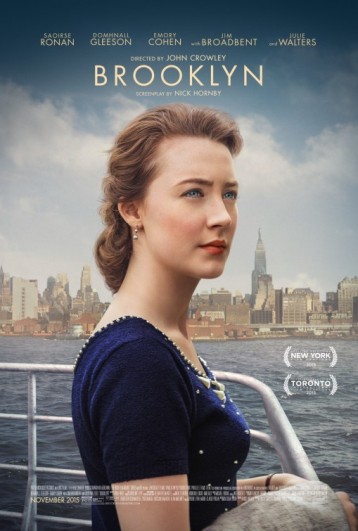Brooklyn (John Crowley, 2015)
Even in the times when Brooklyn – a new film by Irish director John Crowley (Closed Circuit), based on the 2009 best-selling novel of the same name, by Irish author Colm Tóibín – doesn’t quite work, it still firmly holds our attention, thanks to the mesmerizing central performance by lead (also Irish – Erin go bragh!) actress Saoirse Ronan (Atonement). And those times are few and far between, since this lovely period piece about a young woman’s migration from the Emerald Isle to the Big Apple in the early 1950s tackles big, universal issues about the human condition in small, concrete ways that make the tale accessible to all. Who hasn’t left home to find their way in the world, only to wonder at one’s place in it? Beautifully photographed and (mostly) brilliantly acted, the movie is a gentle coming-of-age story that showcases a young star on the rise.
I have not read Tóibín’s book, so I do not know how faithful is this adaptation – written by novelist-turned-screenwriter Nick Hornby (Wild) – but I can say that the script moves along briskly, starting first in Ireland, where twenty-something Eilis (Ronan) lives with her widowed mother and older sister. That sister, Rose, has arranged for Eilis (pronounced “Aye-lish”) to emigrate to America (New York, specifically). There’s nothing for her at home, and Rose insists on a better life for Eilis than what she has for herself. We move quickly past the tearful goodbyes, on to the boat, and then before we know it we’re on Ellis Island, and then in Brooklyn, where Eilis finds herself in an Irish-run boarding house, homesick beyond belief. By day, she works in a department store, doing her best not to cry in front of customers. The kindly Irish ex-pat priest (Jim Broadbent, Le Week-End) who organized her travel realizes that Eilis needs a calling, and sets her up in night classes at Brooklyn College, where she studies to become an accountant. Slowly, Eilis acclimates to her new life. And then one day, she meets a young man, Tony (Emory Cohen, “Smash“) – not Irish, but Italian – and things improve even more. Perhaps Brooklyn will offer Eilis the opportunities of which her sister dreamed.
But this is a far more complex tale than that, and soon a tragedy at home calls Eilis back to her native land, where she is forced to confront big questions of what constitutes “home.” Thanks to Ronan’s beautifully nuanced rendering of Eilis’ central conflict – should I stay or should I go? – we are completely drawn to her struggle. Director Crowley shoots the Ireland of these later scenes in warm, orange hues that are in sharp contrast to the washed-out grays and blues of the opening, further complicating the push and pull of old vs. new. With the arrival of an unexpected – Irish – suitor (Domhnall Gleeson, Ex Machina), Eilis’ situation is made even trickier. Is the life she has made for herself in Brooklyn – with Tony – enough to overcome the nostalgic allures of her birthplace? Well, if I told you, there’d be no reason to see the movie …
The film features an impressive ensemble cast, especially in scenes in the boarding house, where an array of new Irish immigrants is overseen by the delightfully prickly Mrs. Kehoe (Julie Walters, Mrs. Weasley in the Harry Potter films). While everyone in the film – Irish and Italian, alike – is somewhat of an ethnic caricature, these portrayals make sense as evocations of how foreign ethnicities might be seen through the eyes of other new immigrants. Unfortunately, the one performance of which I am (slightly) less of a fan is Cohen’s. While his Tony is sweet and loving, and perhaps just what Eilis needs to soothe her loneliness, I never for one moment buy him as an adult male about to make his way in the world. Plus, his adoption of “Eye-tal-ian” mannerisms – in contrast to the more subtle behaviors of the actors playing the other members of his family – is a bit much. And though I am usually no fan of Gleeson’s, his restrained lovesick (and manly) rival to Tony, back in Ireland, creates an imbalance in favor of a return to Eire, which is not, I believe, the filmmakers’ intent. That issue, aside, however, the film is superbly done, and a powerful portrait of a strong female protagonist coming into her own.


Chris – I loved this film and fully agree with these two reviews:
http://www.rogerebert.com/reviews/brooklyn-2015
http://www.rollingstone.com/movies/reviews/brooklyn-20151104
And I, as well as everyone I’ve talked with, loved Emory Cohen!
Carole Hamlin
Thanks for reading. I loved the film, too, just not Emory, so much.